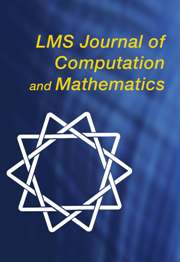Article contents
Growth in Baumslag–Solitar groups I: subgroups and rationality
Published online by Cambridge University Press: 01 February 2011
Abstract
The computation of growth series for the higher Baumslag–Solitar groups is an open problem first posed by de la Harpe and Grigorchuk. We study the growth of the horocyclic subgroup as the key to the overall growth of these Baumslag–Solitar groups BS(p,q), where 1<p<q. In fact, the overall growth series can be represented as a modified convolution product with one of the factors being based on the series for the horocyclic subgroup. We exhibit two distinct algorithms that compute the growth of the horocyclic subgroup and discuss the time and space complexity of these algorithms. We show that when p divides q, the horocyclic subgroup has a geodesic combing whose words form a context-free (in fact, one-counter) language. A theorem of Chomsky–Schützenberger allows us to compute the growth series for this subgroup, which is rational. When p does not divide q, we show that no geodesic combing for the horocyclic subgroup forms a context-free language, although there is a context-sensitive geodesic combing. We exhibit a specific linearly bounded Turing machine that accepts this language (with quadratic time complexity) in the case of BS(2,3) and outline the Turing machine construction in the general case.
Information
- Type
- Research Article
- Information
- Copyright
- Copyright © London Mathematical Society 2011
References
- 6
- Cited by

